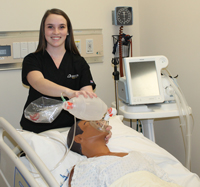Respiratory Care program's sim labs and clinicals prepare students for in-demand employment
Thursday, March 7, 2019
 PEOSTA—Since the age of five, Megan Zieser has envisioned a future career caring for others.
PEOSTA—Since the age of five, Megan Zieser has envisioned a future career caring for others.
The 2017 Edgewood-Colesburg High School graduate planned to follow in her mother’s footsteps by becoming a Registered Nurse until Work-Based Learning and job shadowing experiences offered through her school introduced Zieser to respiratory therapy.
“As I started researching healthcare professions, I discovered respiratory care and started job shadowing an R.T. (Respiratory Therapist) at Regional Medical Center in Manchester,” she explained. “She really encouraged me to enroll in Northeast Iowa Community College’s Respiratory Care program, and I can see why.”
After enrolling in the NICC program in fall 2018, Zieser observed the many benefits the program offered to students and graduates.
“Respiratory Care students at Northeast Iowa Community College have access to great simulations labs for their training. You can start clinical rotations in hospitals eight weeks into the program, the faculty is great and class sizes are small. It’s a better fit for me,” Zieser emphasized.
Zieser also found that clinical experience sites are more varied, with students completing their requirements in Madison, Wis., and Iowa City, as well as locally in the Dubuque area. These requirements are some of the program’s greatest strengths, according to Amy Rausch, NICC Respiratory Care instructor and program director.
"The Respiratory Care program’s clinical requirements give our students opportunities to gain experience in respiratory and cardiovascular care for a variety of patients, both adult and pediatric. We also take a comprehensive approach to our student’s education and training through classroom and simulation labs. Because of their career preparation, graduates are in high-demand for employment with healthcare providers in the tri-state area,” Rausch stated.
Zieser completed her clinical experiences last fall at UnityPoint Health-Finley Hospital in Dubuque and is currently in clinical rotation at Mercy Medical Center this spring. “Caring for patients that I see in the hospital setting is the best part of the program because I’m helping them get better,” Zieser added.
Her rotation at University of Wisconsin-Madison Hospitals and Clinics begins this summer. This academic year, Zieser also received the Scott Sieverding Memorial Scholarship to support her education and training in the Respiratory Care program.
According to EMSI Inc. research for northeast Iowa, Respiratory Therapist occupations are among the top trending careers for wages and job growth for community college graduates. The research indicated an annual salary range for qualified graduates at $44,265 - $59,773 and an occupational projected growth of five percent.
Respiratory care practitioners are allied health specialists who play a crucial role within the healthcare team. Working closely with physicians and other healthcare professionals, they care for patients with respiratory and cardiovascular conditions. Under the supervision of a physician, they are involved with the assessment, treatment, diagnostic testing, rehabilitation and prevention of conditions that affect the respiratory and cardiovascular systems. Employment opportunities are found in hospitals, clinics, home healthcare agencies, product support and sales, education, rehabilitation and continuing care and health/disease prevention programs.
Graduates with an Associate of Applied Science (AAS) degree from Northeast Iowa Community College are eligible for credentialing exams offered by the National Board for Respiratory Care (NBRC). The program is accredited by the Commission on Accreditation for Respiratory Care (CoARC). Learn more at www.nicc.edu/respiratorycare.
